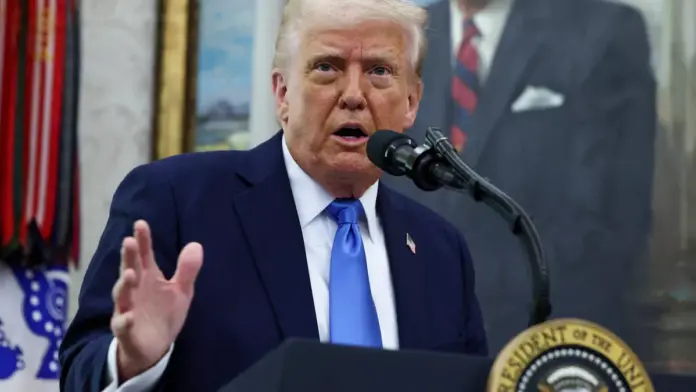President Trump’s tariffs policy is recasting the map of global trade. By imposing a 10% import tariff on almost every commodity and hitting China with up to 145% tariffs, America has set shockwaves around global markets in motion. The move, the largest since the Great Depression, has invited searing criticism from world economies, particularly the European Union.
IMF Forecasts Slower Growth Everywhere
The International Monetary Fund (IMF) recently cut its forecast of global economic output. It now predicts global production to decline from 3.3% in 2024 to 2.8% in 2025. America, which has long been the world’s fastest-growing economy, is forecasted to have its GDP decline from 2.8% to 1.8%. The main cause for this decline is tariff-related uncertainty and supply chains being disrupted.
IMF chief economist Pierre-Olivier Gourinchas reported, “The global economic order that has held for the last 80 years is being reconfigured.” He cautioned that the tariff spike and uncertainty are hurting productivity and sustainable growth.
Also read: NFL Legend Steve “Mongo” McMichael Dies at 67 After Battle with ALS
European Union on High Alert
America’s number one trading partner, the European Union, has not been immune to this fallout. While Trump has temporarily suspended tariffs on EU imports until July, the threat of a 20% tariff still hangs over them. The EU threatened to retaliate if these plans proceed.
For EU policy-makers, this is a dilemma of the first order. Do they ramp up the trade war or pivot to new markets and domestic resilience? Most are leaning toward remaking trade strategy to diminish reliance on the U.S. entirely.
“Reciprocal” Tariffs Create Uncertainty
Trump’s notion of “reciprocal tariffs” is also shaking international trade relations. It is straightforward in theory: if a country taxes U.S. goods, then the U.S. will reciprocate. But on the ground, it has added to uncertainty. European exporters have nightmare planning as the tit-for-tat policy breeds uncertainty. Investment and expansion plans are now on hold at many companies as the uncertainty beckons.
Inflation Rises as Trade Tensions Deepen
Another source of concern is inflation. The IMF has also raised its inflation forecast for the U.S., from 2% to 3% this year. Prices are rising on the back of higher import costs, and whereas the IMF hopes that this inflation is only temporary, the harm to productivity can be lasting.
In Europe, governments are attempting to cushion the shock with fiscal assistance. But this is just in the short run. Long-term strategies are starting to pay greater attention to self-reliance and increasing intra-European trade.
Also read: Trader Joe’s Store Opening At 21 New Locations: Find Out Where
Pressure Mounts on Central Banks
The political pressure doesn’t end at tariffs. Trump has openly rebuked Federal Reserve Chairman Jerome Powell for not cutting interest rates quickly enough. Some worry he may even try to oust Powell before his term expires. Such actions would erode central bank independence, which is key to preserving market confidence.
The EU is paying close attention. The likelihood of U.S. monetary policy turning political constitutes another risk element in transatlantic economic relationships.
A Trend Towards Strategic Diversification
The Trump-age tariffs have communicated a clear message: dependence on U.S. markets is no longer risk-free. The European Union will most likely react by seeking new bilateral trade agreements, reinforcing regional trade, and making investments in industries at home.
While Trump hopes that these tariffs will make nations construct in America, others view them as a wake-up call to de-risk U.S. dependence. The EU is now aggressively pursuing deals with Asia, Latin America, and Africa to diversify its trade basket.
Conclusion
Trump’s tariffs have ushered in a new age of international trade. The EU, with uncertainty and economic danger looming large, is now re-examining its entire trade policy. Whether they do it by way of retaliation, diversification, or innovation, the bloc is gearing up to evolve. One thing is certain: international trade will never go back to the way it used to be.








